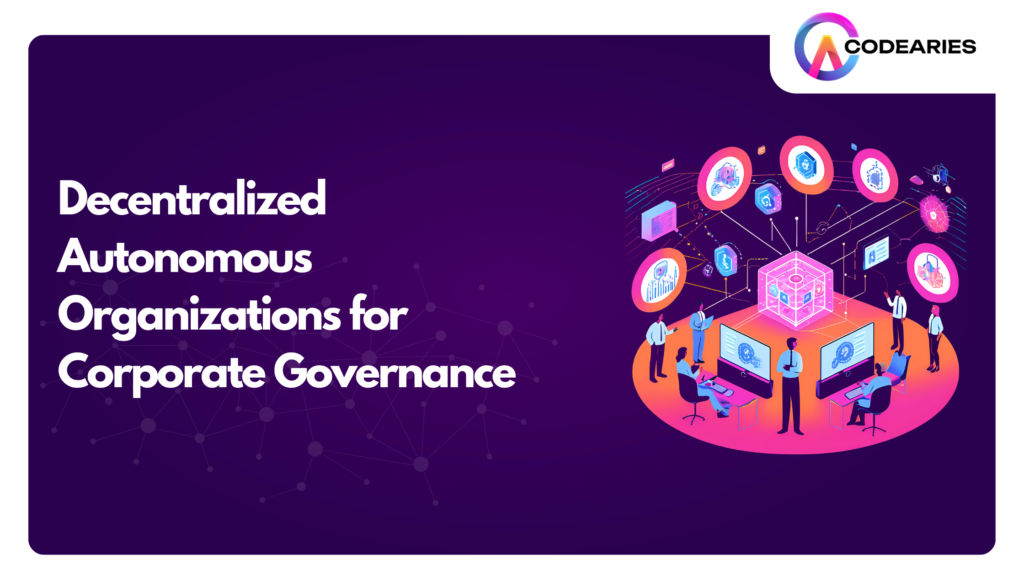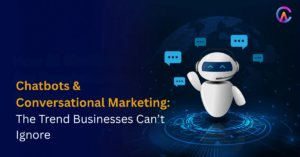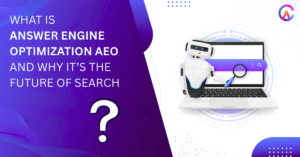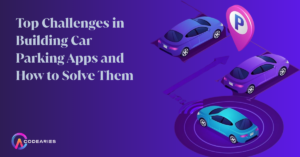Decentralized Autonomous Organizations (DAOs) are changing corporate governance. They offer a decentralized model focused on transparency, community-driven decisions, and autonomy. Using blockchain, smart contracts, and token-based voting, DAOs move away from traditional hierarchies. This allows individuals to manage organizations together.
This article explores how DAOs are transforming corporate governance, the benefits they offer, and the challenges they face in becoming mainstream.
What Are DAOs?
Imagine a digital community where every member has an equal say in decision-making, but instead of gathering in a physical space, all interactions happen online using a digital currency. This is the essence of a Decentralized Autonomous Organization (DAO).A DAO is an organization that runs on blockchain technology, using smart contracts to execute decisions and enforce rules automatically. DAOs are unique because there is no single leader or central authority; governance is shared equally among all participants who hold the organization’s tokens. This ensures that every voice matters in how the organization is run. These DAOs span various sectors, from finance to arts and have collectively managed assets worth over $37 billion (DeepDAO, 2024), showcasing the potential and robustness of their governance models.
A Simple Example of a DAO in Action
To illustrate this concept, let’s consider a group of gamers who want to create a new online game. Rather than starting a traditional company with a CEO, board members, and hierarchical management, they form a DAO. They write a protocol—a set of rules and guidelines—defining how the game will be built, how decisions will be made, and how any profits will be shared.Anyone interested in being part of the project can join the DAO by purchasing its tokens. The more tokens someone holds, the more influence they have in key decisions such as:
- What features should be included in the game?
- What strategies should be used to monetize the game?
- How should any profits be divided among token holders?
These decisions are made through a voting system. Members submit proposals, and everyone who holds tokens has the right to vote. Once voting occurs, the smart contract automatically counts the votes and executes the decision based on the outcome, ensuring no one can manipulate the process.
The Potential of DAOs to Transform Governance
Though DAOs are still in their early stages, they hold great potential to revolutionize how we organize and make decisions. By decentralizing power and enabling collective decision-making, DAOs offer a vision of a future where governance is more democratic, transparent, and inclusive. As technology evolves and more people become familiar with blockchain and smart contracts, DAOs could become a mainstream way of running organizations—whether in business, nonprofits or even local governance. A system where everyone has an equal voice and power is distributed more equitably could change the way we think about leadership and collaboration in the digital age.
As technology evolves and more people become familiar with blockchain and smart contracts, DAOs could become a mainstream way of running organizations—whether in business, nonprofits or even local governance. A system where everyone has an equal voice and power is distributed more equitably could change the way we think about leadership and collaboration in the digital age.
How DAOs Redefine Corporate Governance
Decentralized Autonomous Organizations (DAOs) are transforming corporate governance by replacing traditional hierarchical models with blockchain-based, community-driven structures. Here’s how they’re reshaping the landscape:
- Decentralized Decision-Making:DAOs distribute governance power among all token holders, eliminating top-down authority and enabling collective decision-making. Key choices, such as strategy and funding, are made through community votes.
- Transparency and Accountability: Every transaction, vote, and decision is recorded on the blockchain, ensuring full transparency and trust. The immutable nature of these records prevents manipulation and fosters confidence in the governance process.
- Global Participation and Diversity: DAOs allow anyone with internet access to participate, enabling global collaboration and diverse perspectives. This inclusivity enhances decision-making and avoids the biases found in traditional leadership models.
- Efficiency and Agility: By automating administrative tasks through smart contracts, DAOs reduce overhead and speed up decision-making. The lack of bureaucracy makes DAOs highly responsive to market changes and opportunities.
- Innovative Tokenomics: DAOs use tokens to align stakeholder interests and incentivize active participation. Customizable financial models, such as revenue-sharing or community funding, offer flexibility and support sustainable growth.
DAOs offer a more inclusive, transparent, and efficient governance model, empowering communities while challenging traditional corporate structures.
Investment in DAOs for Corporate Growth: Capital-Raising and Financial Strategies
Decentralized Autonomous Organizations (DAOs) are transforming corporate growth with a community-driven, transparent business model. Unlike traditional corporations, DAOs decentralize governance and use blockchain technology. This structure opens new opportunities for raising capital, managing finances, and driving growth. By investing in DAOs, companies can access novel financial strategies, connect with broader investor pools, and foster deeper community engagement.
Capital-Raising Strategies in DAOs
Initial DAO Offering (IDO)
One of the most effective ways DAOs raise capital is through an Initial DAO Offering (IDO). Like an Initial Coin Offering (ICO), an IDO involves selling DAO tokens to investors to raise funds for the organization. However, an IDO takes a more decentralized approach by using blockchain technology to facilitate token sales directly between the DAO and investors, bypassing traditional intermediaries such as banks or brokers.
- Inclusive Funding: IDOs allow DAOs to attract a broad range of investors, from retail participants to institutional backers like venture capitalists and corporate investors.
- Global Reach: By removing geographic barriers and regulatory intermediaries, DAOs can raise funds from global investors, democratizing access to capital.
Treasury Management through Smart Contracts
DAOs can use smart contracts to automate treasury management, enabling transparent, secure, and decentralized financial operations. This means that the DAO can manage its funds in real time without intermediaries or traditional banking infrastructure.
- Automated Fund Allocation: IDOs or token sales can automatically direct funds to specific goals, such as product development or asset acquisition.
- Liquidity Provision: DAOs can use funds to provide liquidity or finance internal projects, generating returns while ensuring transparency.
- Transparency: The blockchain records all transactions, allowing members to track fund usage and ensuring trust and accountability.
Tokenized Securities
DAOs can issue tokenized securities, digital representations of ownership in the organization, or specific assets to appeal to institutional investors seeking exposure to decentralized markets.
- Access for Traditional Investors: Tokenized securities can mimic traditional stocks or bonds on the blockchain, making it easier for institutions to enter the decentralized economy.
- Ownership Fractionalization: Tokenized assets enable DAOs to divide ownership of valuable assets, like real estate or intellectual property, allowing smaller investors to participate.
Financial Strategies for Corporate Growth in DAOs
Decentralized Finance (DeFi) Integration
DAOs can use Decentralized Finance (DeFi) protocols to access various financial services, such as lending, borrowing, and yield farming, which can help fund the DAO’s growth initiatives.
- Access to Capital: DAOs can raise liquidity or borrow funds against their token holdings on DeFi platforms, providing capital for growth projects.
- Yield Generation: By providing liquidity or staking on DeFi platforms, DAOs can earn yield on their token reserves, generating passive income to support operations.
Community-Driven Funding
A unique aspect of DAOs is the opportunity for community-driven funding. Token holders can fund specific initiatives or projects through crowdfunding or direct contributions.
- Collective Ownership:Fosters a sense of responsibility and involvement, as members directly contribute to funding the DAO’s future.
- Empowered Participation: By allowing token holders to vote on funding decisions, DAOs create a transparent and collective approach to project selection, enabling the community to shape the organization’s direction.
Strategic Partnerships
DAOs are not isolated; they can form strategic partnerships with other DAOs or traditional corporations to collaborate on joint initiatives, pool resources, and expand market reach.
- Collaborative Growth: Partnerships can bring fresh ideas, expertise, and shared resources, accelerating product development and enhancing the DAO’s value proposition.
- Cross-Sector Innovation: Traditional businesses can also partner with DAOs to access decentralized innovations such as blockchain solutions, tokenization of assets, or decentralized governance models.
The Challenges of DAO Governance
Despite their potential, DAOs need help hindering their widespread adoption in corporate governance. A major challenge for DAOs is legal recognition, as many jurisdictions do not yet treat them as legal entities, hindering their ability to enter contracts or own property. Scalability also poses difficulties; as DAOs grow, governance becomes more complex, which can slow decision-making and increase the risk of wealthier token holders gaining disproportionate influence. Additionally, security is a concern, as vulnerabilities in smart contracts can compromise a DAO’s integrity, and once deployed, fixing flaws in the code is often not feasible.
Conclusion
DAOs provide an alternative to traditional corporate governance by using blockchain technology for transparent, autonomous, and community-driven decision-making. While challenges like legal recognition, scalability, and token distribution remain, DAOs have the potential to transform organizational operations. As the technology evolves and gains acceptance, DAOs could become central to modern governance, enhancing transparency and efficiency.
FAQs
What is an example of a DAO?
A well-known example of a DAO is MakerDAO, which governs the Maker Protocol and manages the DAI stablecoin. MakerDAO allows token holders to vote on key decisions, such as adjusting interest rates and collateral requirements, using a decentralized governance system. This ensures that the protocol operates according to the collective preferences of its community.
How do DAOs make money?
DAOs can generate revenue through various mechanisms. Some charge transaction fees for services like lending or swapping tokens, while others generate income from investments made by pooling resources. In some cases, DAOs can also profit from appreciating their governance tokens, which increase in value as the DAO becomes more successful.
Who profits from a DAO?
The people who profit from a DAO are typically its token holders. These participants may earn rewards through staking or receiving a portion of the DAO’s revenue, such as transaction fees or investment profits. Additionally, contributors who provide value to the DAO, such as developers or liquidity providers, may receive compensation in the form of tokens or fees.
What is a DAO Tool?
A DAO tool is software that helps manage the operations and governance of a DAO. These tools enable members to vote on proposals, manage funds, and facilitate decision-making. Examples include Aragon, which creates DAOs and manages governance, and Snapshot, which allows decentralized voting without on-chain transactions. These tools simplify the management of DAOs and enhance collaboration.







